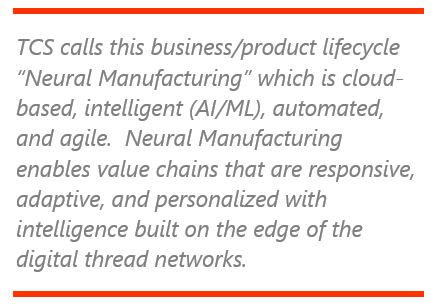

Tata Consulting Services (TCS) recently rolled out a comprehensive strategy for transforming business called Digital 
Additionally, TCS has defined a new set of PLM imperatives that it calls Business 4.0 in the New Normal (post COVID) and aligns with the Industry 4.0 initiative. Business 4.0 is a new business lifecycle predicated on purpose-driven, adaptable, and resilient business transformation, which the company refers to as Neural Manufacturing. Neural Manufacturing is cloud-based, intelligent (AI/ML), automated, and agile to enable value chains that are responsive, adaptive, and personalized with intelligence built on the edge of the digital thread networks.
TCS has defined four imperatives for PLM and the new normal:
With its Digital Thread for Connected Product paradigm, TCS strives to take the fundamental concept of the digital thread and the digital twin to its full functional implementation strategy.
TCS has had a strong industry presence in PLM solutions for over 25 years. The company has strategic partnerships with the leading PLM solutions providers like Dassault Systèmes, Siemens Digital Industries Software, PTC, SAP, and Oracle. TCS’s integrated engineering information and digital services range across many industries. These include automotive, aerospace & defense, machinery & process, hi-tech & telecom, life sciences, energy & utilities, and retail & consumer packaged goods. TCS offers a full portfolio of solutions across the product/process lifecycle, including product development, plant engineering, and IoT and Industry 4.0.
TCS is offering a set of solutions based on the digital value chain and the digital thread connecting all fundamental product/process lifecycle elements. This digital thread would start with product concepts, design, and manufacturing and extend through delivery and service to product end-of-life. In this age of IoT and Manufacturing 4.0, companies must employ digital twins to design smart and connected products, use advanced materials and manufacturing process, operate a digital supply chain, and provide services for products in the field. Further, an end-to-end connected PLM innovation platform must operate through a closed-loop feedback system that allows the digital thread to function properly. This is the digital business transformation value proposition that TCS is offering with its digital thread-based connected innovation platform.
TCS has identified key characteristics that are essential to conceptualizing and implementing a functional and comprehensive digital thread.
Several key functional elements enable the TCS digital thread platform to work. These include agile, automated, and intelligent cloud-based systems. But the most important functional element for the digital thread is pervasive connectivity. TCS has created a connected user experience across a comprehensive digital thread that provides foundational continuity through engineering design, manufacturing, and services. These, in turn, provide a collaborative product lifecycle ecosystem predicated on a model-based enterprise. This digital thread-connected architecture can then be used to implement actionable use cases in which product concepts and requirements can move through functional, logical, and physical modeling stages to product validation. At the same time, the product development process can move through connected bills of materials (BOMs) for engineering, manufacturing, as-built, service, and maintenance.
Clearly, TCS has built a comprehensive PLM architecture around the fundamental concepts of the digital thread to help further connect the product development ecosystem. Manufacturers across multiple industries can now use this architecture to develop and implement a digital thread for the connected product.
Business 4.0 is a trademark of Tata Consulting Services.
ARC Advisory Group clients can view the complete report at ARC Client Portal
If you would like to but this report or obtain information about how to become a client, please Contact Us
Keywords: Digital Thread, Connected Product Development, Business 4.0, Business Transformation, Neural Manufacturing, ARC Advisory Group.

